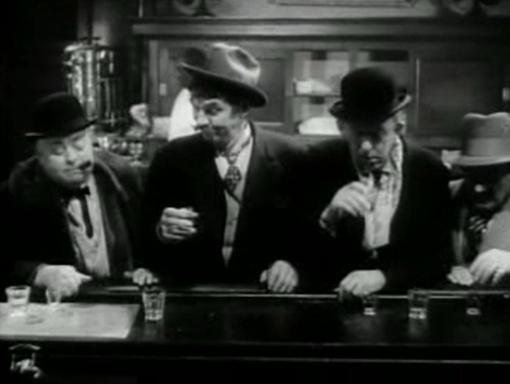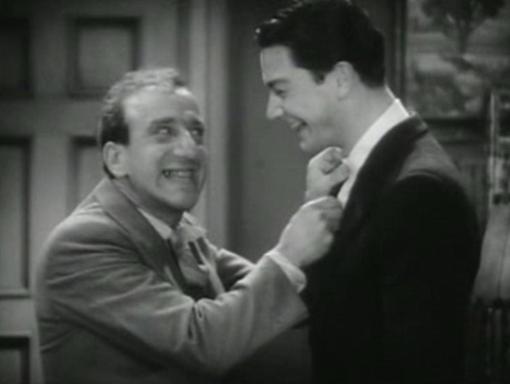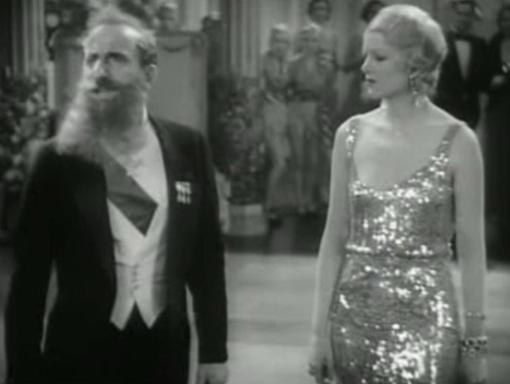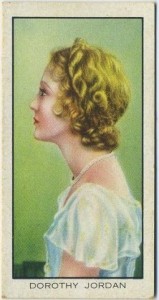Damned if you do, damned if you don’t seems to be the muddled message of The Wet Parade (1932). Adapted from a novel by teetotaler Upton Sinclair and brought to the screen by MGM with hard-drinking Victor Fleming directing, The Wet Parade makes no bones about drink being bad, but so too is legislation against drink.
A very definite product of its times, the two seemingly opposing messages do naturally work together. But that is despite their mode of delivery in The Wet Parade which is heavy-handed in all aspects. Some form of moderation is obviously the answer except this picture can’t find it. Everything is pretty much as extreme as can be.
Clocking a hair under two hours we spend the first quarter of that time in the South with the Chilcote clan headed by Lewis Stone as Roger Sr. Once we head North we stay North, with the younger generation of Southerners represented by Chilcote’s children, Maggie May (Dorothy Jordan) and Roger, Jr. (Neil Hamilton), transplanted into the city as well.
Our sole reason for seeing the South at all is to witness the ugly demise of Lewis Stone’s stumbling Southern aristocrat whose primary reason for existence on screen is to prove that the problem of drink is everywhere.
Minus the Chilcotes The Wet Parade would have offered its views from a single place, a typical big city filled with speakies, bootleggers and Prohibition agents. It might not have played in the sticks, but it would have worked better as a whole
Upon moving North we meet Stone’s urban equivalent, local political huckster Pow Tarleton (Walter Huston). Pow is every bit the drinker as Stone’s Roger Chilcote had been at the start of the story, he just doesn’t have Chilcote’s cozier background. In fact Pow has few responsibilities remaining by the time we meet him. The hotel his family owns seems to be entirely run by his sober son, Kip (Robert Young), with encouragement from his mother, played by Clara Blandick.
While Lewis Stone’s patriarchal character only showed us how terrible alcoholism is, right down to the DTs, we get to live through the political push towards Prohibition through Walter Huston’s character.
We see the shabby Huston stand up and speak in favor of Wilson’s re-election and then depart to the bar afterwards where he’s celebrated by a party backer (Harry Holman) and others. Drinks flow heavy and patrons start dropping at the bar. One man is tossed into the back alley; another, upon passing out, has his wife (Eily Malyon) plead unsuccessfully with a police officer to arrest him in order to help straighten him out. Finally Pow’s son Kip comes to collect him and is answered with a hard strike across the face from his father’s walking stick. The policeman tells Pow he’s got to go after that.
Upon Wilson’s victory we’re treated to an early rendition of Huston’s famous later dance upon finding gold in The Treasure of the Sierra Madre (1948). His Pow Tarleton, feeling no pain, celebrates Wilson’s victory as his own.
Despite heavy hitters Stone and Huston headlining the cast, the real stars of The Wet Parade are Robert Young and Dorothy Jordan, as the dry children of Huston and Stone respectively, and Neil Hamilton as Jordan’s brother. Hamilton’s Roger, Jr. is a real chip off the old block who drinks heavily well into the Prohibition era. Once Prohibition is enforced Young’s Kip Tarleton loses both of his parents to tragic circumstances and seeks revenge by becoming a Prohibition Agent for the Government where he’s paired in the field with, of all people, Jimmy Durante.“Why can’t you two stop foisting your family nightmares on the rest of the world,” Chilcote, Jr. snaps at his sister and Kip. After Roger leaves their apartment Kip wonders if his brother-in-law might not be right.
The Wet Parade goes about showing the most extreme and tragic instances of alcoholism that you could imagine, but any of those instances which occur after 1920 in our timeline finds Prohibition itself either casually or completely blamed for the calamity:
- A lawyer pleads a murder case on the defense that the killer had been used to alchohol his entire life before the law took it away.
- When tenants are forced to move their top concern is secretly and safely moving their storehouse of liquor. One comments that the law is going to make them, regular folk, all criminals.
- Inside a speakeasy youngsters, no more than 18, are shown bellying up to the bar. Durante’s Abe Shilling comments that “You never saw that before Prohibition.”
- The Federal Agents that we’re shown are often reluctant about their job. They’re just following orders but have questions and doubts over whether what they’re doing is right and not a waste of time.
- When one of the characters orders their booze from an unknown source we’re shown the complete manufacturing process behind impure liquor before that character suffers terrible physical consequences when drinking the homemade filth.
- Those health consequences are laid at the foot of the government as we’re told they purposely include a chemical in the alcohol to make it undrinkable–sometimes the bootlegger forgets to remove it.
- The final message of the film: “Get out of this racket,” told to formerly gung-ho, now wavering Kip confirms that Prohibition is a losing battle.
On and on the conflicting messages of The Wet Parade go. The movie continually shows us that drink is bad but always has someone hedging that the law is worse. It never takes the side of moderation and thus it doesn’t really make much of a successful argument one way or the other.
While I thought the movie failed to deliver anything beyond a wavering message it is nonetheless entertaining. There are a handful of very violent, often heart-breaking scenes that push the action forward, though probably the best scenes today are those which are more documentary in nature. I’m thinking especially of the scene showing all of the steps in the manufacture of illegal liquor, but also Huston’s earlier political stumping and the entire lead-in to Wilson’s re-election and World War I.
I’d imagine it was an easy day’s work for talents such as Walter Huston and Lewis Stone to play drunks, but each does so quite effectively. Robert Young, very early in his career, is actually very good as the sober younger Tarleton, as is Neil Hamilton as the more boisterous and extremely wet Chilcote, Jr.
I didn’t think much of Dorothy Jordan’s turn as Maggie May, souring on her pretty badly during the final shot from the South in which she delivers what seems like an early Oscar bait speech that just falls flat. Up North her quick forgiveness of Young’s impure assumption about her wasn’t very believable and after that her character seemed to settle down so much that she was no longer worth giving much thought to.
Jimmy Durante gives one of the more interesting performances of The Wet Parade. It’s a far more serious part than most of what I’ve seen him in during this period, though that’s not saying much and his Abe Shilling is still mostly comic in tone. His ha-cha-cha’s didn’t fit too well in The Wet Parade for me, but if you’re a Durante fan that’s not going to bother you in the least.
Wallace Ford has a nice harmless part as the mutual friend of the younger Tarleton and Chilcote boys, though other than serving as a link between the two male stars he doesn’t have much of a purpose.
Joan Marsh has a small part as Maggie May’s stuck-up blonde friend and Myrna Loy is even more stuck-up than that as Chilcote, Jr.’s girlfriend. Loy is sort of a Texas Guinan, but like some of the others we don’t see a heck of a lot of her. Hers is certainly the most glamorous role in The Wet Parade.
A fascinating historical aspect of The Wet Parade is its timing. It is attempting to document the effects of liquor and Prohibition upon a set of characters both before and during Prohibition, but without knowledge yet that there would definitely be an after.
Sinclair’s novel came out in 1931 and MGM began filming it in January 1932 with The Wet Parade having its premier in Beverly Hills, March 17, 1932, almost a year before Franklin Delano Roosevelt was elected President. By the time the film was released popular sentiment now favored repeal of the 18th Amendment, however it took Roosevelt’s election and the subsequent ratification by the States of the 21st Amendment before Prohibition was fully repealed on December 5, 1933.
So The Wet Parade was telling a story that didn’t have an ending yet, though they wouldn’t have known that at the time.
Sinclair was actually quite happy with MGM’s version of The Wet Parade. The studio purchased the recently published novel from the Socialist writer for $25,000. It was adapted by John Lee Mahin and directed by Victor Fleming in their first of several times working together. Almost everything the soon to be legendary Fleming touched after The Wet Parade is now a classic, but this one was the director’s first assignment under his MGM contract.
Given Sinclair’s abhorrence of liquor, and the genesis of his novel was a response to a Literary Digest article purporting the public’s desire for repeal, I’d imagine most of the snide asides against the law were touches by Mahin and/or Fleming. Sinclair must have caught them, but nonetheless later wrote that it was “an excellent picture, following my story closely” (Ross 159).Reiterating my original point, The Wet Parade is certainly a product of its time. This very specific time in fact, during the first half of 1932.
Morality meets politics in an uneven epic treatment.
Shave a half hour off the front and tone down much of what follows and I think it’d hold up better and play less as a confused propaganda piece.
As it is The Wet Parade is a great showcase for Robert Young and Neil Hamilton, offers good work from Lewis Stone and Walter Huston and interesting appearances by Jimmy Durante and Myrna Loy. Well worth the watch and relevant viewing on the heels of the recent three part Prohibition Documentary from Ken Burns.
“I favor the modification of the Volstead Act just as fast as the Lord will let us.” — Presidential candidate Franklin Delano Roosevelt only months later.
[phpbay]wet parade, 12, “45100”, “”[/phpbay]
Source:
- Ross, Steven J. Movies and American Society
. Malden, MA: Blackwell Publishing, 2002.













Leave a Reply